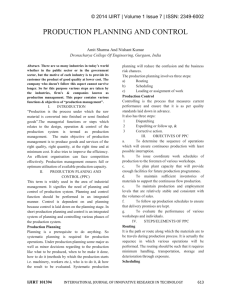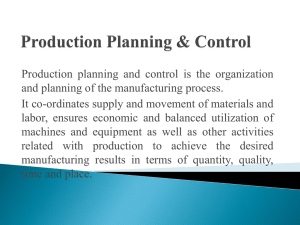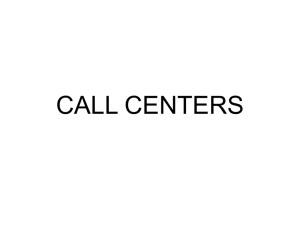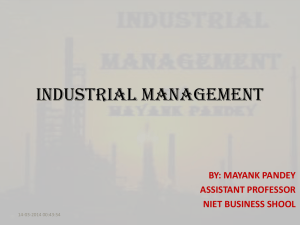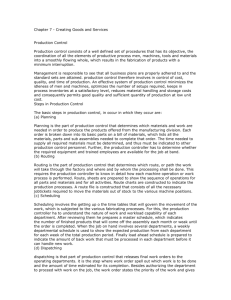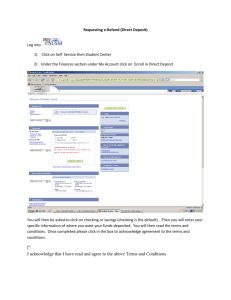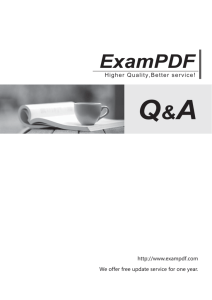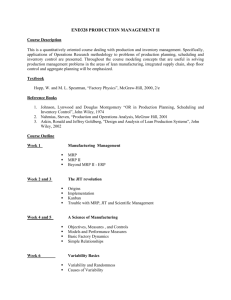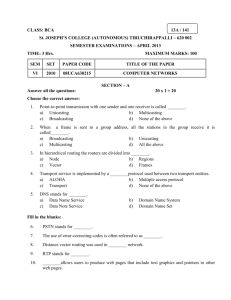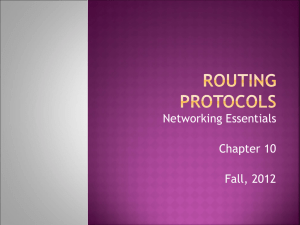PRODUCTION PLANNING AND CONTROL (PPC)
advertisement
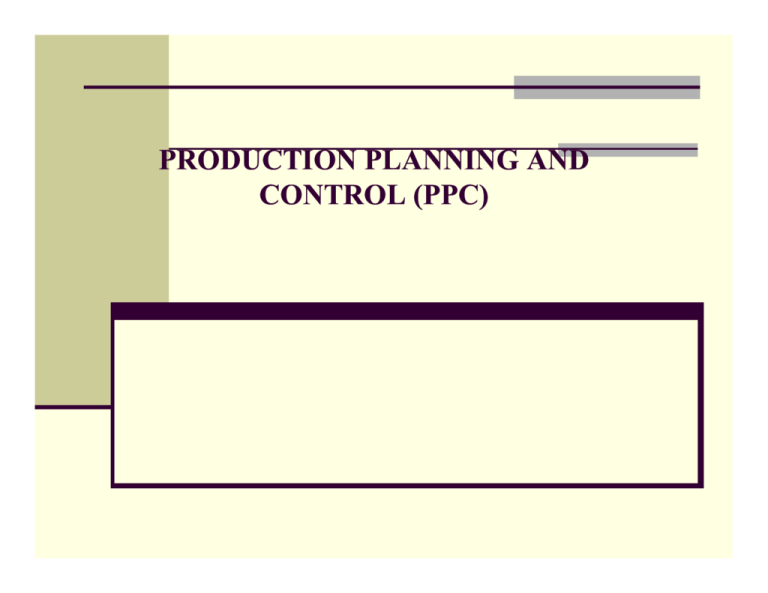
PRODUCTION PLANNING AND CONTROL (PPC) PLANNING CONTROL PRODUCTION Planning+ Control = Productivity CONTENT Production System Production Planning Items Controlling Items Nature of MRP PRODUCTION… PRODUCTION PLANNING AND CONTROL (PPC) PRODUCTION: that transformation of raw materials to finished goods. PLANNING: looks ahead, anticipates possible difficulties and decides in advance as to how the production, best, be carried out. CONTROL: phase makes sure that the programmed production is constantly maintained. PRODUCTION SYSTEM System is a whose function is to convert a set of inputs into a set of desired outputs. PRODUCTION PLANNING Given a specific process planning, process technologies and production conditions predetermine varieties, quantities, qualitiy, and scheduled of products to be produced according to market demand of products.. And Where we are-----------? Destination ---------------? TIME DIMENSIONS Long Range Planning; is done annually and focus on a planning horizon greater than one year. Medium Range Planning; usually covers a period from 6 months to 18 months, with monthly or sometimes quarterly time increments. Short Range Planning; covers a period from one day or less to six months, with weekly time increment usually. PRODUCTION PLANNING PLANNING ROUTING SCHEDULING LOADING PRODUCTION PLANNING PLANNING That may be defined as the technique of foreseeing every step in a long series of seperate operations. Each step to be taken at the right time, and in the right place and each operation to be performed in maximum efficiency. PRODUCTION PLANNING ROUTING Under this operations , their path and sequence are established. The main aim of routing; determine the best and cheapest sequence of operations and to ensure that this sequence is strictly followed. PRODUCTION PLANNING Routing procedure involves following different activities; An analysis of the article to determine what to make and what to buy To determine the quality and type of material Determining the manufacturing operations and their sequence An analysis of cost of the article Determination of scrap factors PRODUCTION PLANNING SCHEDULING It mainly concerns with time element and priorities of a job. The pattern of scheduling differs from one job to another which is explained as below: Production Schedule Master Schedule Manufacturing Schedule PRODUCTION PLANNING LOADING Defined as the relationship between load and capacity, so as to assign the work for the production. Capacity: the time available for work at work centres expressed in machine hours or in man hours. Load: to assign work to the capacity available at particular work centres. It includes the assignment of the work to the operators at their machines or work places. PRODUCTION PLANNING Loading determines; who will do the work as routing determines; where and scheduling determines; when it shall be done. PLANNING PHASE PRIOR PLANNING Forecasting Type, Quantitiy,Quality Product Design Specifications,Bill of Materials Order Writing To undertake a particular job. PLANNING PHASE ACTIVE PLANNING Process Planning and Routing Economic Process, How to do, Where to Work Materials and Tools Control Requirements, Controls Loading Assignment of Work, Manpower, Machinery Scheduling Time Phase, Sequence of Work PLANNING PHASE ACTION PHASE Dispatching Ordering to start the working CONTROL PHASE Progress Reporting Data Reporting, Performance Comparison Corrective Phase Expediting, Replanning PRODUCTION CONTROL DISPATCHING FOLLOWING UP INSPECTION CORRECTIVE PRODUCTION CONTROL Production control; is the process of planning production in advance of operations, establishing the extract route of each individual item part or assembly, setting, starting and finishing for each important item, assembly the finishing production and releasing the necessary orders as well as initiating the necessary follow-up to have the smooth function of the enterprise. PRODUCTION CONTROL DISPATCHING Involves issue of production orders for starting the operations. Movement of materials to different workstations Movement of tools and fixtures necessary for each operation Beginning of work on each operation PRODUCTION CONTROL DISPATCHING Recording of time and cost involved in each operation Movement of work from one operation to another in accordance with the route sheet Inspecting or supervision of work PRODUCTION CONTROL FOLLOW UP It includes delays or deviations from the production plans. It helps to reveal detects in routing and scheduling, misunderstanding of orders and instruction, under loading or overloading of work. PRODUCTION CONTROL INSPECTION To ensure the quality of goods. It can be required as effective agency of production CORRECTIVE MEASURES involve any of those activities of adjusting the route, rescheduling of work changing the workloads, repairs and maintenance of machinery or equipment, control over inventories of the cause of deviation is the poor performance of the employees MATERIAL REQUIREMENT PLANNING (MRP) PHILOSOPHY MRP- Materials should be expedited when their lack would delay the overall production schedule. AIM of MRP Renawal of products inventory To meet customer orders FACTORS OF MRP Main Production Plan Product Tree Inventory Situation Folder Performance Report Planned Order Schedule Special Situation Report Assignments: 1. What do you understand by Production Planning and Control? Explain the various steps. 2.Explain objectives of PPC. THANK YOU FOR YOUR LISTENING
